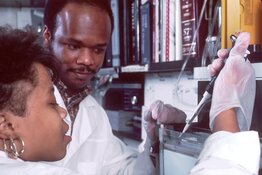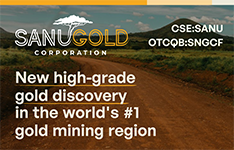The Life Sciences Report: It's been a turbulent year for the biotechs. Why?
Chen Lin: In general, the market is favoring big caps. The capital market for small caps is tough. Small-cap biotech companies constantly need to raise capital to sustain research. But it seems like every time a small-cap biotech raises a lot of money, its shares are hit hard. One reason is that small caps have fewer investors than the large caps. Small cap investors like to sit back, waiting for the shares to drop so they can get in at a good price.
TLSR: Has the Ebola epidemic in Africa impacted your investment strategy?
CL: We successfully traded two stocks around the Ebola issue. When the Ebola fear was high, we sold at the peak—right after the second nurse was infected in Texas. We booked a nice profit.
TSLR: Which Ebola-related stocks did you sell?
CL: One of my long-term holdings, Sarepta Therapeutics Inc. (SRPT:NASDAQ), has a drug candidate for treating Ebola virus disease. It had discontinued a Phase 1 trial, but the drug had been effective in previous tests. When Sarepta's CEO, Chris Garabedian, talked about the Ebola product on CNBC, I sold some of my position. When the Ebola fears quieted down a few days later, I bought it back. I've done that two or three times. That buy-sell-buy strategy has lowered my cost base.
"To be successful, an investor must be nimble."
Another Ebola-related stock that did well for me was NewLink Genetics Corp. (NLNK:NASDAQ.GM). It has an Ebola vaccine candidate. Very few people had heard about it. I got in at around $20/share, when the vaccine, initially developed by researchers in Canada, started testing. The vaccine testing in animal and nonhuman primate studies showed it was very effective, according to the Canadian government. I sold NewLInk close to $40/share a week later—a very pleasant trade, indeed.
TLSR: Can you tell us a little bit more about NewLink?
CL: Yes. The company has a line of promising biotech products. NewLink's management has a very good reputation and a fine track record. But my trading around NewLink was just for Ebola. [Editor's note: An agreement to partner with Merck & Co. Inc. (MRK:NYSE) on development of the NewLink Ebola vaccine was announced on Nov. 24.]
TLSR: Ebola is not over yet. It could continue—hopefully, not—but do you see any further opportunities there?
CL: Ebola is not over. However, the nurses are fully recovered. That confirms my original assessment of a couple of months ago, which was that Ebola can be contained. NewLink plans to start testing its Ebola vaccine soon in the U.S., the European Union and in a large Phase 2 trial in Africa. GlaxoSmithKline (GSK:NYSE) is also testing its Ebola vaccine in Phase 2 in Africa. If the tests are successful, NewLink's stock has a lot more upside.
TLSR: Can you tell me a little bit more about Sarepta's Ebola product?
CL: With its RNA drug platform, Sarepta is well positioned to attack the Ebola virus. It had done testing on its product that was sponsored by the U.S. Department of Defense. Those tests were quite successful, but the government stopped sponsoring the trials due to a budget cut. Sarepta kept a few dozen usable doses of its Ebola drug on hand, though. When CNBC was featuring any company with a product that could cure Ebola, Sarepta was one of them. The publicity provided me with a nice trade. With the recent Ebola outbreak, I believe the chance is high our government will sponsor the development again.
TLSR: The U.S. Food and Drug Administration (FDA) recently threw Sarepta a curveball on its Duchenne muscular dystrophy (DMD) program. How did that affect its prospects?
CL: Sarepta is focused on treating DMD, not Ebola. The recent FDA communications with Sarepta are disappointing. The FDA found a problem in one of Sarepta's manufacturing facilities. It can be fixed if the FDA will work with Sarepta.
"There are a lot of small-cap deals in the biotech realm; that makes management experience very important."
The DMD formula is a magical drug candidate, in my opinion. That is why we invested in Sarepta. This drug candidate has zero side effects! Sarepta should have enough money to get through drug approval if the FDA allows it to file a new drug application (NDA) in H1/15. I think political pressure will convince the FDA to give Sarepta a chance for approval in 2015. This drug can save the lives of children suffering from DMD.
TLSR: What did the FDA findings do to Sarepta's stock?
CL: As I told my subscribers, when I saw the recent news of the FDA giving Sarepta a hard time, I reduced my position. It is not good for a company to be fighting with the FDA. Sarepta is one of the most heavily shorted stocks in the biotech space.
TLSR: Does Sarepta have other products in the pipeline?
CL: It has the Ebola and other antivirus drugs, but the DMD drug is key.
TLSR: Do you have suggestions for investors who hold Sarepta stock?
CL: I am still holding a core position. If the data continues to look good—and I have no reason to doubt that it will—Sarepta will be successful in the end. The FDA is under a lot of pressure from the parents with DMD-afflicted children and from other people in the industry. The FDA does not want to change its ways. But in the end, it's a taxpayer-funded institute. The FDA will have to answer to the patients, to the parents. I believe that Sarepta's DMD drug will be approved in 2015–2016.
TLSR: Are Sarepta's competitors pressuring the FDA?
CL: Prosensa Holding N.V. (RNA:NASDAQ) is Sarepta's main competitor. The issue with Prosensa's competing drug candidate is that its toxicity is very high. As a result, it can only dose 6 milligrams per kilogram (6 mg/kg), whereas Sarepta can dose 50 mg/kg. That is why the effectiveness of Sarepta's drug is so overwhelming; it is a very similar RNA technology to Prosensa's candidate, but the dose is higher. Prosensa was a partner with Glaxo in a Phase 3 trial that failed. Glaxo withdrew from the partnership, but Prosensa is still filing an NDA. Ironically, the FDA is not rejecting that application.
"Management teams with a good vision can acquire some very good assets."
Prosensa was just taken over by BioMarin Pharmaceuticals Inc. (BMRN:NASDAQ). That transaction shows renewed interest in the space. It makes Sarepta an interesting takeover target as well. [Editor's note: The BioMarin acquisition of Prosensa for $840 million was announced on Nov. 24.]
TLSR: Who do you like in the cancer space?
CL: I own Sorrento Therapeutics Inc. (SRNE:NASDAQ). This undervalued biotech is researching a bioequivalent to Celgene Corp.'s (CELG:NASDAQ) blockbuster Abraxane (paclitaxel). The data will come out in Q1/15 and an NDA could be made in Q3/15. At that point, the market will suddenly wake up to the good news that Sorrento has a drug that can compete with Celgene's key product. Frankly, Sorrento also would be a good takeover candidate for Celgene.
TLSR: What is Sorrento's stock trading at now relative to where it was a year ago?
CL: Sorrento is trading around $4/share. A year ago it was at $15/share. The company raised money a few months ago at $5/share. That is where I got in. I feel that Sorrento will soon be posting a very significant result. Insiders have been buying, and I am holding on to the stock. My understanding is that the managers have enough capital to last until the end of 2015. The key results will be out in Q1/15, and the company should be filing the NDA by Q3/15. That should be positive news for the share price.
TLSR: What qualities do you look for in the management of a biotech firm?
CL: For firms I intend to hold for a while, I focus on an executive's asset management skills and deal-making experience. There are a lot of small-cap deals in the biotech realm. Because it is very hard to go public, many small companies sell themselves or merge with other biotechs to provide liquidity. That makes management experience very important. For example, Sorrento acquired its key asset, the drug candidate competing against Celgene's, from another company last year. Management teams with a good vision can acquire some very good assets.
TLSR: What other innovative biotech firms do you like?
CL: I have been holding Neptune Technologies & Bioressources Inc. (NEPT:NASDAQ; NTB:TSX) for a long time. It has a krill oil-based product. Krill oil is different from fish oil because it is very easy to absorb. It can reduce triglycerides, reduce low-density lipoprotein (LDL), and increase high-density lipoprotein (HDL). No other drug can do that.
Neptune is really under the radar. Its stock is not trading very high. The company is going through a management change: It has taken on industry veteran Jim Hamilton as the new CEO. Its stock went over $2/share on the news.
Neptune has built up its production line to 150 tons/year of krill oil. It has also reached a remarkable licensing agreement, by which other krill oil manufacturers have to pay Neptune a royalty. The company has a very solid balance sheet. It recently announced a stock repurchase. Insiders are buying the stock. It should be a solid ride in 2015.
TLSR: You put out a scorecard for your investments. Who are your best biotech firm performers this year, and who has not met expectations?
CL: The best performer is NewLink. Its stock almost doubled in one week. The most disappointing performer is Sarepta because of the FDA's recent communication. It has been a very tough year. But to be successful, an investor must be nimble. I like to get into the stocks that few people have noticed, and then sell when people get excited.
TLSR: Are there any other life science juniors that you would like to call to our attention today?
CL: I like another company that also has a problem with drug approval, AcelRx Pharmaceuticals Inc. (ACRX:NASDAQ). The company should be able to refile its NDA in H1/15. I have owned this stock for a while, and I now have a smaller position than I had before. But I am closely watching it. AcelRX is going through a management change. It should have enough capital to last until the FDA approval. We are looking at an H1/15 filing and, hopefully, in H2/15, a final approval.
TLSR: What is the nature of its drug?
CL: It is an innovative way to kill pain called Zalviso (sufentanil sublingual microtablet system). After a painful operation, many patients are hooked up to intravenous morphine bottles for pain control. This is a painkilling product that the patient puts underneath the tongue. It has been very successful in Phase 3.
TLSR: What has the trajectory of AcelRx's stock been?
CL: If Zalviso gets approval, AcelRx should return to double digits. It trades at about $6.70/share currently.
TLSR: Thank you, Chen.
 Chen Lin writes the popular stock newsletter What Is Chen Buying? What Is Chen Selling?, published and distributed by Taylor Hard Money Advisors, Inc. While a doctoral candidate in aeronautical engineering at Princeton, Chen found his investment strategies were so profitable that he put his Ph.D. on the back burner. He employs a value-oriented approach and often demonstrates excellent market timing due to his exceptional technical analysis.
Chen Lin writes the popular stock newsletter What Is Chen Buying? What Is Chen Selling?, published and distributed by Taylor Hard Money Advisors, Inc. While a doctoral candidate in aeronautical engineering at Princeton, Chen found his investment strategies were so profitable that he put his Ph.D. on the back burner. He employs a value-oriented approach and often demonstrates excellent market timing due to his exceptional technical analysis.
Want to read more Life Sciences Report interviews like this? Sign up for our free e-newsletter, and you'll learn when new articles have been published. To see recent interviews with industry analysts and commentators, visit our Streetwise Interviews page.
DISCLOSURE:
1) Peter Byrne conducted this interview for Streetwise Reports LLC, publisher of The Gold Report, The Energy Report, The Life Sciences Report and The Mining Report, and provides services to Streetwise Reports as an independent contractor. He owns, or his family owns, shares of the following companies mentioned in this interview: none.
2) The following companies mentioned in the interview are sponsors of Streetwise Reports: None. The companies mentioned in this interview were not involved in any aspect of the interview preparation or post-interview editing so the expert could speak independently about the sector. Streetwise Reports does not accept stock in exchange for its services.
3) Chen Lin: I own, or my family owns, shares of the following companies mentioned in this interview: Sarepta Therapeutics Inc., Sorrento Therapeutics Inc., Neptune Technologies & Bioressources, AcelRx Pharmaceuticals Inc. I personally am, or my family is, paid by the following companies mentioned in this interview: None. My company has a financial relationship with the following companies mentioned in this interview: None. I was not paid by Streetwise Reports for participating in this interview. I determined and had final say over which companies would be included in the interview based on my research, understanding of the sector and interview theme. Comments and opinions expressed are my own comments and opinions. I had the opportunity to review the interview for accuracy as of the date of the interview and am responsible for the content of the interview.
4) Interviews are edited for clarity. Streetwise Reports does not make editorial comments or change experts' statements without their consent.
5) The interview does not constitute investment advice. Each reader is encouraged to consult with his or her individual financial professional and any action a reader takes as a result of information presented here is his or her own responsibility. By opening this page, each reader accepts and agrees to Streetwise Reports' terms of use and full legal disclaimer.
6) From time to time, Streetwise Reports LLC and its directors, officers, employees or members of their families, as well as persons interviewed for articles and interviews on the site, may have a long or short position in securities mentioned. Directors, officers, employees or members of their families are prohibited from making purchases and/or sales of those securities in the open market or otherwise during the up-to-four-week interval from the time of the interview until after it publishes.









































